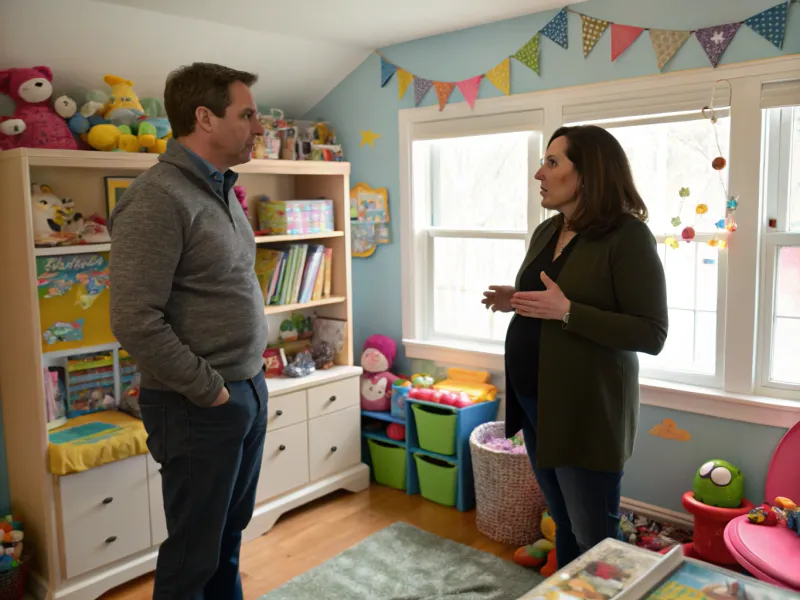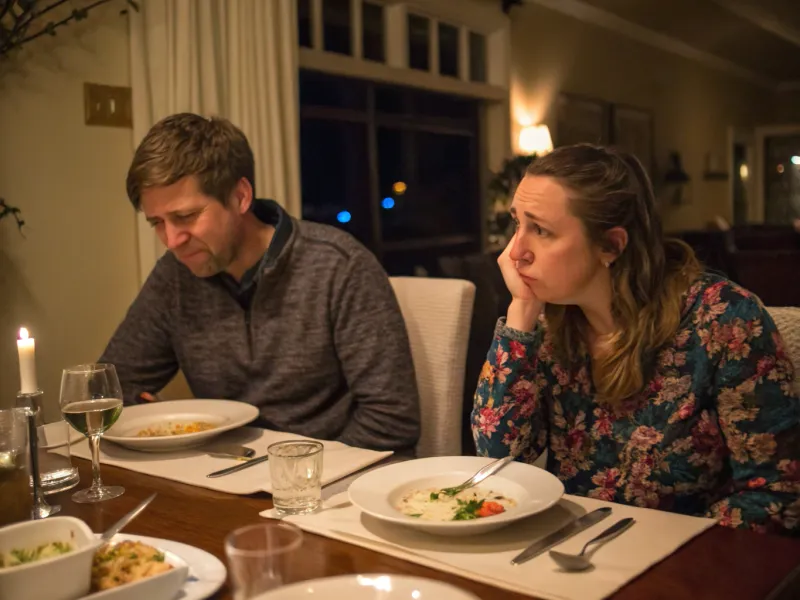39 Biggest Deal Breakers You Shouldn’t Ignore In Any Relationship
Navigare nel complesso mondo delle relazioni può essere un'avventura. Quali sono le cose che fanno o fanno crollare una relazione?
This blog dives into the top 39 deal breakers that can turn love into a bumpy road. Whether you’re in a new romance or a long-term commitment, these insights could be your relationship lifesaver. Each item explores a unique aspect that can cause friction between partners.
Let’s uncover what truly matters and how to steer clear of relationship disasters.
1. Mancanza di comunicazione

Ever tried talking to someone and feeling like you’re speaking a different language? That’s how it feels when communication breaks down. In any relationship, it’s crucial to share thoughts, feelings, and concerns openly. Without it, misunderstandings can pile up like laundry. Picture trying to solve a puzzle with missing pieces—that’s what it feels like.
I’ve been there, trying to express myself only to be met with silence or confusion. It was like trying to tune into a radio station with nothing but static. Una relazione forte si basa sulla comprensione reciproca, and that’s impossible without talking.
Think of communication as the bridge that connects two hearts. Without it, you’re left on opposite sides of a chasm. So, next time you’re feeling misunderstood, remember: it’s not just about talking, but also about listening and engaging genuinely with each other’s inner worlds.
2. Infedeltà

Imagine the feeling of being crushed under a weight you can’t lift. That’s what infidelity can do to a relationship. Trust, once shattered, is hard to rebuild. It leaves a lingering doubt, a shadow that follows every iota of happiness.
Una volta una mia amica mi ha confidato il suo strazio quando ha scoperto che il suo partner le era stato infedele. È stato come vedere un bellissimo quadro che veniva fatto a pezzi davanti ai suoi occhi. Il tradimento ha tagliato in profondità, lasciando una cicatrice che il tempo ha faticato a rimarginare.
The foundation of love is trust, and when that’s broken, ogni interazione si tinge di sospetto. It’s like trying to enjoy a beautiful sunset through a fogged window. Honesty and loyalty are the cornerstones of any strong relationship. Without them, love finds it hard to survive. Choose to be truthful, and let trust illuminate your path together.
3. Obiettivi di vita diversi

Vi siete mai sentiti come se voi e il vostro partner foste su pagine diverse dello stesso libro? Obiettivi di vita diversi possono dare questa sensazione. Compromettere i sogni è difficile, soprattutto quando entrambi avete una visione chiara del futuro.
In one relationship, I faced this dilemma. I wanted to travel the world, while they dreamed of a settled family life. It felt like pulling a cart in two directions—neither of us could move forward.
When aspirations don’t align, it’s essential to communicate and find common ground. It’s not about sacrificing dreams but weaving them together into a shared tapestry. Picture two architects designing a home with different blueprints; collaboration is key. Love thrives when both support each other’s ambitions, crafting a future that resonates with shared values and dreams.
4. Mancanza di rispetto

Il rispetto è l'eroe non celebrato di ogni relazione. It’s the quiet acknowledgment of each other’s worth, opinions, and feelings. Without it, love can feel like a one-way street.
Respect isn’t just about grand gestures; it’s in the small, daily interactions. It’s listening without interrupting, and valuing opinions even when they differ.
Love flourishes when respect is mutual, creating a space where both partners feel valued and understood. It’s like the gentle sunlight that nurtures a garden, helping love bloom in its full glory.
5. Incompatibilità finanziaria

Il denaro parla e a volte discute. Incompatibilità finanziaria può portare a una notevole tensione nella relazione, poiché le diverse abitudini di spesa si scontrano.
Finding financial harmony involves open dialogue and compromise. It’s about setting common financial goals and respecting each other’s financial philosophies.
Picture two musicians playing different tunes—harmony arises when they listen and adjust to each other’s rhythm. Love and money can coexist peacefully with patience and understanding.
6. Mancanza di apprezzamento

Ever felt like your efforts go unnoticed? A lack of appreciation can make love feel unreciprocated. Everyone wants to feel valued, to know that their actions contribute to the relationship’s well-being.
I’ve been in a relationship where my gestures were met with indifference. It was like baking a cake that no one tasted. The lack of acknowledgment made love feel one-sided, like watering a plant that never blooms.
Appreciation doesn’t require grand acts, it’s the little thank-yous, the unexpected notes, the genuine acknowledgment of efforts. It’s like a gentle breeze that keeps the flame of love burning brightly. Celebrate each other’s contributions, and watch your relationship flourish with gratitude and warmth.
7. Disonestà

Trust is fragile, and dishonesty can shatter it. Lies, even small ones, weave a web that can trap and suffocate a relationship. It’s the fear of the truth being uncovered that erodes trust.
Truth nurtures trust, allowing love to breathe freely. It’s about being open, even when it’s uncomfortable. Embrace truthfulness, and let it guide your relationship to deeper connections.
8. Indisponibilità emotiva

Essere emotivamente non disponibile è come costruire dei muri intorno al proprio cuore. Lascia l'altra persona isolata, incapace di connettersi a un livello più profondo. L'amore ha bisogno di intimità emotiva per prosperare.
Once, I was with someone who couldn’t express their feelings. It was like talking to a wall, each word bouncing back without reaching them. It left a void, making love feel shallow and incomplete.
Emotional availability is about vulnerability, sharing fears, dreams, and insecurities. It’s the glue that binds souls together, creating a safe space for love to grow.
9. Critica costante

Le critiche possono sembrare una pioggia incessante, che inzuppa lo spirito d'amore. Quando diventa un'abitudine, diminuisce l'autostima e crea un ambiente tossico.
Constructive feedback is healthy, but when it turns into incessant fault-finding, love struggles to survive. It’s about offering support, not tearing down. Choose kindness, and let your relationship blossom with positivity and encouragement.
10. La gelosia

La gelosia è come un incendio, consuma la fiducia e lascia ceneri di insicurezza. Nasce dalla paura di perdere ciò che si apprezza di più e spesso sfocia nella possessività.
In una relazione passata, la gelosia ha agito come un predatore silenzioso, insinuandosi in ogni interazione. Era come camminare su gusci d'uovo, cercando di evitare di innescare sospetti. Soffocava l'amore che una volta sembrava così libero.
Overcoming jealousy involves building self-confidence and trust in each other. It’s about celebrating your partner’s independence, not fearing it. Trust in the bond you share, and watch jealousy fade away.
11. Mancanza di intimità

Intimacy is the heartbeat of love. Without it, a relationship can feel like a barren desert, devoid of warmth and connection. It’s about closeness, both physical and emotional.
Riaccendere l'intimità richiede sforzo e comprensione. It’s about creating moments that bring hearts closer, whether through shared experiences or tender touch. Like a cozy blanket on a chilly night, intimacy wraps love in warmth, strengthening the bond that ties you together.
12. Vite sociali diverse

Balancing different social lives can be challenging. It’s like sharing a dance floor with different rhythms, each partner moving to their own beat.
Navigating social differences involves compromise and understanding. It’s about supporting each other’s preferences and finding common ground.
Celebrate la vostra individualità e apprezzate i momenti che condividete, creando una relazione equilibrata e appagante.
13. Trascurare la cura di sé

Self-care isn’t selfish; it’s essential. Neglecting it can lead to burnout, affecting the relationship. It’s about nurturing yourself to be the best partner you can be.
Practicing self-care means setting boundaries and respecting each other’s need for space.
Abbracciate le attività che ricaricano lo spirito e vedrete l'amore sbocciare con rinnovata energia e gioia.
14. Incapacità di compromesso

L'ostinazione può essere un ostacolo in amore. L'incapacità di scendere a compromessi crea tensione e discordia, come due fiumi che si scontrano invece di fondersi.
Compromise isn’t about losing, it’s about creating a win-win scenario.
15. Appiccicosità

L'appiccicosità può sembrare di indossare un maglione troppo stretto, che soffoca la relazione. Nasce dall'insicurezza, dalla paura di essere lasciati indietro.
Finding balance involves building self-confidence and trust. It’s about giving each other space to breathe and grow. Celebrate your individuality while cherishing the connection you share.
16. Ignorare i limiti

I confini sono come recinzioni invisibili che proteggono lo spazio personale e l'individualità. Ignorarli può portare a risentimenti e conflitticome calpestare un bel giardino senza cure.
Once, I was with someone who didn’t respect my need for alone time. It felt like an invasion, like a gentle stream being overwhelmed by a flood. It left me feeling suffocated and undervalued.
Respecting boundaries is essential for a healthy relationship. It’s about understanding each other’s limits and honoring them. Love thrives when boundaries are acknowledged and cherished, nurturing trust and respect.
17. Manipolazione emotiva

Emotional manipulation is a silent thief, stealing joy and self-esteem. It’s about controlling through guilt, fear, or deceit, leaving one partner feeling trapped.
In una relazione ho sperimentato la sottile arte della manipolazione. Era come essere una marionetta, con i fili tirati per suscitare reazioni. Questo ha eroso il mio senso di sé, facendo sentire l'amore come un gioco perverso.
Breaking free involves recognizing manipulation and setting firm boundaries. It’s about reclaiming your power and self-worth. Choose a relationship built on equality and respect, where love lifts rather than controls.
18. Problemi irrisolti del passato

Portare con sé questioni irrisolte del passato è come trascinare una valigia pesante nella vita. Appesantisce il presente, influenzando la relazione.
Healing involves acknowledging past wounds and working through them. It’s about letting go of baggage to embrace the present fully.
19. Diversi stili genitoriali

Parenting is a journey, and different styles can create turbulence. It’s about navigating diverse philosophies on raising children, like steering a ship through varying tides.
Finding common ground involves open dialogue and compromise. It’s about blending parenting styles into a harmonious approach. Create a shared vision that reflects love and respect for each other’s perspectives.
20. Abuso di sostanze

L'abuso di sostanze è un'ombra che può oscurare la relazione più luminosa. Influisce sulla fiducia, sulla comunicazione e sulla stabilità emotiva, come una nuvola di tempesta che aleggia sopra di noi.
I witnessed a friend struggle with their partner’s addiction. It felt like watching a ship being tossed by relentless waves, unsure if it would reach safe shores. The emotional toll was immense, affecting their love and life.
Sostenere un partner con problemi di sostanze richiede compassione e aiuto professionale. Cercate aiuto insieme e lasciate che la guarigione illumini il vostro cammino verso una relazione più sana.
21. Famiglia prepotente

Family can be a source of support and joy, but sometimes they can overstep boundaries, affecting the relationship. It’s about balancing family dynamics with your partnership.
Secondo la mia esperienza, in una famiglia prepotente può sembrare di essere coinvolti in un braccio di ferro. Ciascuna delle due parti si tira dietro l'attenzione e l'influenza, lasciando poco spazio alla crescita personale. Questo crea tensione, facendo sentire l'amore come un campo di battaglia.
Stabilire dei limiti implica una comunicazione aperta e il rispetto reciproco. L'amore fiorisce quando i ruoli familiari sono chiaramente definiti, permettendo alla relazione di crescere forte e indipendente.
22. Trascurare la relazione

Trascurare la relazione è come lasciare che un giardino appassisca senza cure. Nasce dal dare per scontato l'altro e dal dimenticare di coltivare l'amore che lo lega.
I’ve seen relationships fade as routines took over. The absence of effort left an emptiness that love struggled to fill.
Reviving a neglected relationship involves intentional effort and attention. It’s about making time for each other, and celebrating the connection you share.
23. Promesse infrante

Le promesse non mantenute possono sembrare piccole crepe che alla fine mandano in frantumi la fiducia. Ogni promessa non mantenuta mina la fiducia, facendo vacillare l'amore.
Keeping promises strengthens trust, creating a reliable bond. It’s about accountability and respect for each other’s expectations. Make your word your bond, and let trust be the cornerstone of your relationship.
24. Mancanza di avventura

Una relazione stagnante può sembrare uno stagno senza brezza, privo di emozioni e novità. L'amore desidera l'avventura, la scintilla che lo mantiene vivo e vibrante.
L'iniezione di avventura implica la ricerca di nuove esperienze insieme.
25. Incompatibilità

Incompatibility can feel like pieces of a puzzle that don’t fit. It arises from differing values, interests, or lifestyles, creating gaps that love struggles to bridge.
Ogni tentativo di allineamento sembra una forzatura di pezzi mal assortiti, che lascia entrambi frustrati. La mancanza di un terreno comune può far sentire l'amore teso e distante.
Addressing incompatibility involves honest conversations and acceptance. Embrace diversity, and let it enhance your relationship’s unique beauty.
26. Rabbia irrisolta

La rabbia irrisolta può ribollire sotto la superficie come un vulcano in attesa di eruttare. Influenza la comunicazione e la connessione emotiva, lasciando l'amore su un terreno traballante.
Healing involves acknowledging and addressing anger, sand eeking constructive solutions. It’s about open dialogue and empathy.
27. Controllo eccessivo

Excessive control can feel like being trapped in a cage, stifling individuality and freedom. It’s about one partner dictating terms, leaving the other feeling powerless and confined.
I’ve seen relationships where control overshadowed love, like a shadow blocking the sun. It created a toxic environment, suffocating the joy that love once brought. The lack of autonomy made the relationship feel like a prison.
28. Mancanza di supporto emotivo

Supporto emotivo is the cushion that softens life’s blows. Without it, love can feel like a lonely journey, each challenge magnified by isolation.
Offering emotional support involves empathy and presence. It’s about being there for each other, sharing burdens, and celebrating joys. Be the anchor in each other’s storms, and let love grow strong and steadfast.
29. Aspettative non soddisfatte

Le aspettative non soddisfatte possono sembrare un palloncino che perde aria, sgonfiando speranze e sogni. Nasce da presupposti che non vengono comunicati, facendo sentire l'amore inadeguato.
Aligning expectations involves open dialogue and realistic goals. It’s about understanding each other’s desires and finding common ground. Communicate openly, and let love exceed your wildest dreams.
30. Disattenzione

Inattention can feel like being invisible in your own story. It’s about neglecting the small moments that make love special, leaving the relationship feeling empty.
Reviving attention involves intentional presence and engagement. It’s about cherishing the moments you share, making each one count. Picture a spotlight illuminating a stage—love thrives when attention is focused and intentional.
31. Eccessivo egocentrismo

Il comportamento egocentrico può essere causa di rottura quando uno dei due partner dà priorità ai propri bisogni rispetto alla relazione. Questa concentrazione su se stessi può far sentire l'altro trascurato e poco importante, portando a una rottura del legame emotivo.
A balanced relationship requires both partners to show empathy and understanding. By actively listening and valuing each other’s perspectives, they can maintain harmony and mutual growth.
Addressing self-centered tendencies involves acknowledging the partner’s needs. Regularly engaging in shared activities can strengthen bonds, paving the way for a more inclusive and loving relationship.
32. Natura inesorabile

Rancore può sembrare di portare uno zaino pesante in un lungo viaggio. Drena energia e gioia, facendo sentire l'amore un peso.
In una relazione, il perdono incombeva come una nuvola scura, oscurando ogni interazione. Era come cercare di nuotare con i pesi, ogni bracciata era più impegnativa della precedente. L'incapacità di perdonare ostacolava la nostra capacità di andare avanti.
Forgiveness involves letting go of past hurts and embracing healing. It’s about releasing the burden to free love’s potential. Imagine shedding layers to reveal a new beginning—love thrives when forgiveness paves the way for compassion and growth.
33. Comportamento inaffidabile

L'affidabilità è fondamentale in qualsiasi relazione, e un comportamento imprevedibile può essere profondamente inquietante. Quando uno dei due partner non rispetta costantemente gli impegni presi, può generare sentimenti di abbandono e insicurezza.
To counteract this, it’s essential for individuals to follow through on promises. Consistency builds trust, reinforcing the belief that one can depend on the other.
I partner devono sforzarsi di essere affidabili nelle loro azioni e parole. Questa affidabilità alimenta un senso di sicurezza e stabilità, che è fondamentale per una partnership duratura.
34. Impegno eccessivo

Over-committing can feel like juggling too many balls at once, leaving love feeling neglected. It’s about taking on more than you can handle, stretching yourself thin.
In una relazione passata, i nostri programmi sono diventati così fitti che ci siamo dimenticati di trovare del tempo per l'altro. È stato come correre una maratona senza riposo, lasciandoci entrambi stanchi e senza connessione. La mancanza di tempo insieme ha fatto sì che l'amore si sentisse come un ripensamento.
Balancing commitments involves prioritizing what truly matters. It’s about making space for love amidst life’s demands.
35. Romanticismo in dissolvenza

Romance is the spark that ignites love’s flame. When it fades, a relationship can feel like a dimly lit room, Mancano la passione e l'eccitazione.
I’ve experienced times when romance dwindled, like a candle burning low. It left a void, making love feel like a routine rather than a celebration. The absence of romance made the relationship feel stale and uninspired.
Rekindling romance involves intentional gestures and creativity. It’s about keeping the flame alive with surprises and affection.
36. Trattenere le relazioni passate

Nothing kills a relationship faster than the lingering presence of past loves. Whether it’s constantly bringing up an ex in conversation, keeping old romantic keepsakes, or staying emotionally attached to someone from the past, it creates a wedge between you and your current partner.
I once dated someone who couldn’t stop reminiscing about their past relationship—it felt like I was competing with a ghost. No matter what I did, there was always a shadow of “what was” hanging over us. It made me feel like I was just a placeholder instead of a true partner.
Letting go of the past is essential for moving forward. Your partner deserves your full attention, not a divided heart. If you’re still emotionally invested in someone from your past, it’s time to reflect on whether you’re truly ready for a new relationship.
37. Mancanza di valori condivisi

L'attrazione e la chimica sono ottime, ma se your core values don’t align, you might be headed for trouble. Values shape how you view the world—whether it’s family, career ambitions, religion, or lifestyle choices. If you and your partner see life through completely different lenses, maintaining a long-term relationship becomes an uphill battle.
Una volta ho frequentato una persona i cui valori si scontravano completamente con i miei. Mentre io davo la priorità alla stabilità e al legame emotivo, loro vivevano di imprevedibilità e indipendenza. Abbiamo cercato di trovare un compromesso, ma nel profondo nessuno dei due era veramente felice. Le differenze hanno lentamente intaccato il nostro legame, finché non è rimasto nulla.
Love can bridge many gaps, but when it comes to values, alignment matters. Finding someone who shares your core beliefs doesn’t mean you have to agree on everything, but it does mean you’ll build a life together with a foundation that both of you can stand on.
38. Lack of Curiosity About Each Other

When your partner stops being curious about you, it can feel like slowly becoming invisible. A healthy relationship thrives on learning—what makes each other tick, what’s changed over time, what brings joy or stress.
I once dated someone who stopped asking how my day was or what I was passionate about. It felt like we were coexisting, not truly connecting. The silence wasn’t loud—it was empty. And emptiness can be just as hurtful as conflict.
Curiosity shows you still care. It’s not about constant interrogation, but about the little questions that say, “You matter.” When that curiosity fades, love begins to feel stagnant. Keep asking, keep learning, and stay emotionally invested.
39. Treating Love Like a Competition

Love isn’t a scoreboard, but sometimes it feels like one partner is keeping tabs—who apologized first, who gave more, who’s “winning” the relationship. That mindset turns affection into rivalry, and partnership into power struggle.
In one relationship, everything felt like a contest. If I forgot something, they’d bring up the last time they got it right. It felt like being on trial instead of being in love. The constant comparison drained the joy out of even the happiest moments.
True love doesn’t compete—it cooperates. It’s about lifting each other up, not proving who’s better. When you treat your partner as a teammate, not an opponent, that’s when love truly thrives.







